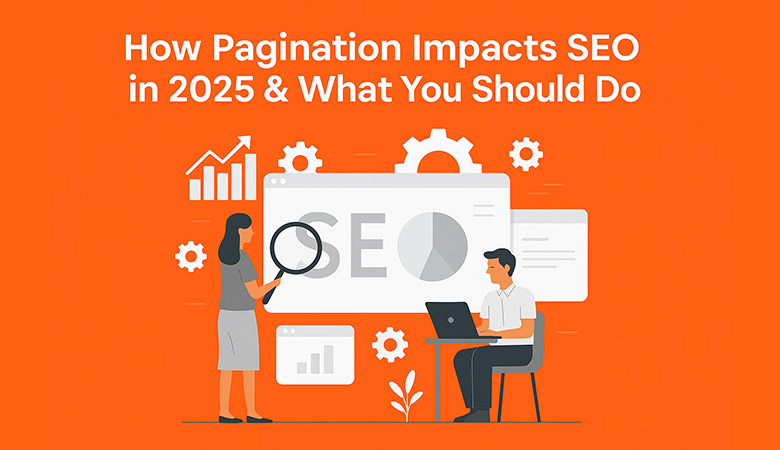How Pagination Impacts SEO in 2025 & What You Should Do
If some of your product pages or blog posts seem invisible on Google, your site’s pagination strategy might be the culprit.
Pagination is crucial in how search engines crawl and index your content. Still, if incorrectly handled, it can lead to duplicate content issues, diluted ranking signals, or even missing pages in search results.
This guide will break down pagination, whether your site needs it for SEO, and the best practices to ensure search engines efficiently crawl and rank your paginated content in 2025. Plus, we’ll cover the latest updates from Google on how they handle paginated pages so you can stay ahead of the curve.
What Is Pagination?
Pagination is a technical framework that divides content across multiple pages while keeping it thematically connected to the main page. It’s commonly used in eCommerce product listings, blog archives, and forums to improve organization and navigation.
When a single page contains excessive content, pagination helps by breaking it into smaller, manageable sections. This enhances user experience by reducing load times and preventing browsers from rendering large amounts of data—especially content users may never scroll to.
However, improper pagination can create SEO challenges, such as duplicate content, inefficient crawling, and diluted link equity. Understanding how to implement pagination correctly ensures search engines process your content effectively.
Why Is Pagination Important for SEO?
Pagination is essential for SEO as it helps search engines crawl, index, and structure large amounts of content effectively. Here’s why it matters:
1. Internal Linking Structure
Pagination strengthens a site’s internal linking by connecting related pages. While pagination links don’t pass significant link authority, they provide structure and help prevent orphaned pages—content without internal links—which Google tends to deprioritize in search results.
2. Crawl Efficiency
While pagination increases a site’s URLs, it doesn’t necessarily hinder crawl efficiency. Search engines can recognize common pagination structures, even without special markup, allowing them to prioritize valuable content while minimizing unnecessary crawling.
3. The End of rel=prev/next
Google previously recommended using rel=prev/next to indicate paginated sequences, but in 2019, it confirmed that it had ignored this markup for years. Instead, Google’s algorithms now automatically recognize pagination patterns. If your site still uses rel=prev/next, it won’t harm SEO, but it’s no longer necessary.
4. Indexing
Without proper pagination, search engines may struggle to find and index deeply nested content like blog posts, news articles, products, or user-generated comments. A well-structured pagination system ensures that essential pages remain accessible to search crawlers.
5. Managing Duplicate Content
Poorly implemented pagination can cause duplicate content issues if search engines misinterpret paginated pages as identical. While pagination isn’t as strong a signal for content consolidation as canonical tags or redirects, it helps search engines differentiate between similar pages when used correctly.
Examples of pagination
One example of pagination is navigating various pages of products results with the help of a single category or feed. Let’s take a look at the page of Engage Coders here:
It will not be practical if you list all of them on just one page.
It may increase vertical scrolling, slowing down page loading times. Hence, you can check the screenshot below to find pagination links:
When users click on a pagination link, the users will be able to move to other listing pages, like page 2:
https://www.engagecoders.com/blog/page/2/
In this URL, page/2/ seems to be a parameter extension of pagination syntax.
Even major retailers like Amazon rely on pagination to organize large volumes of content efficiently.
Beyond structuring pages, pagination plays a key role in helping search engines discover deeply buried products. If a site is too large to list all its products in a single XML sitemap, pagination links serve as an additional pathway for crawlers to access them.
Even when an XML sitemap is in place, internal linking remains crucial for SEO. While pagination links may not carry the strongest ranking signals, they provide the foundational structure to ensure content remains accessible and discoverable.
Pagination in Blogs, News Feeds, and Content Sections
Pagination isn’t just for product listings—it’s also widely used in blog and news feeds to organize content efficiently.
Pagination Within Content
Beyond feed-level pagination, some websites implement pagination within individual pieces of content.
For example, news websites often paginate comment sections when an article receives thousands of responses, making discussions easier to navigate. Similarly, forum threads with lengthy discussions use pagination to break up replies across multiple pages, preventing slow load times and enhancing readability.
Why Pagination Still Matters in 2025: The Infinite Scroll Debate
Over the past two decades, alternative navigation methods have emerged for browsing large amounts of content. Features like “View More” or “Load More” buttons are commonly used under comment sections, while infinite scrolling and lazy-loaded feeds have become popular for displaying posts and product listings.
Some argue that these features improve user experience. Initially popularized by social media platforms like Twitter (now X), infinite scrolling encourages engagement and interaction. However, despite its usability benefits, it hasn’t become the standard for most websites.
From an SEO perspective, the main issue is that search engine crawlers interact with web pages in a limited way. While some headless browsers can execute JavaScript-based content during a page load, search crawlers typically do not “scroll down” to trigger dynamically loaded content.
Search engine bots won’t scroll indefinitely to reveal new content, so sites relying solely on infinite scrolling or lazy loading risk orphaning their articles, products, or comments.
This may not be a concern for large news publishers with strong domain authority and well-structured XML sitemaps, as search engines can still discover their content efficiently. However, relying entirely on infinite scrolling can be detrimental for most websites.
While search crawlers may not interact with scroll-based content feeds, they follow hyperlinks—including pagination links. This makes pagination more reliable and ensures content remains discoverable in search results.
How JavaScript Affects Pagination and SEO
Even without infinite scroll, JavaScript can interfere with pagination and impact how search engines crawl your site.
Since July 2024, Google has reportedly attempted to render JavaScript on all visited pages, but key details remain uncertain:
- Does Google execute JavaScript during the initial crawl, or is it deferred for later processing?
- How does delayed JavaScript execution affect rankings?
- Could Google index a page weeks before rendering JavaScript?
If Google successfully handles JavaScript execution in real time, why are so many websites shifting away from dynamic content? Rather than eliminating JavaScript, many sites are transitioning to server-side or edge-side rendering to ensure users and search engines can access content efficiently.
JavaScript can still create crawling issues even if your site uses traditional pagination links. For example:
- Search engines may not detect if your pagination links are only visible after scrolling.
- If JavaScript is required to load key content, Google may not index certain paginated pages.
Best Practices for Indexing and Canonical Tags on Paginated URLs
SEO professionals often debate how to handle paginated URLs. In the past, many used canonical tags to point paginated pages to their parent page, treating them as non-canonical. This approach was common before Google deprecated rel=prev/next.
However, blocking paginated pages from being indexed—whether through robots.txt or aggressive canonicalization—can be risky.
- In news articles, paginated comments may add value by connecting a page with keywords it wouldn’t otherwise rank for, potentially driving additional traffic.
- In eCommerce, restricting paginated product feeds could cause some products to become soft-orphaned, making them harder to discover.
Partner with our Digital Marketing Agency
Ask Engage Coders to create a comprehensive and inclusive digital marketing plan that takes your business to new heights.
Contact Us
Many SEO strategies aim for complete crawl control, but being overly restrictive can do more harm than good. Before limiting paginated URLs, ensure that the trade-off in crawl efficiency is worth losing potential organic traffic. If you’re unsure, don’t block these URLs—keep them accessible!









